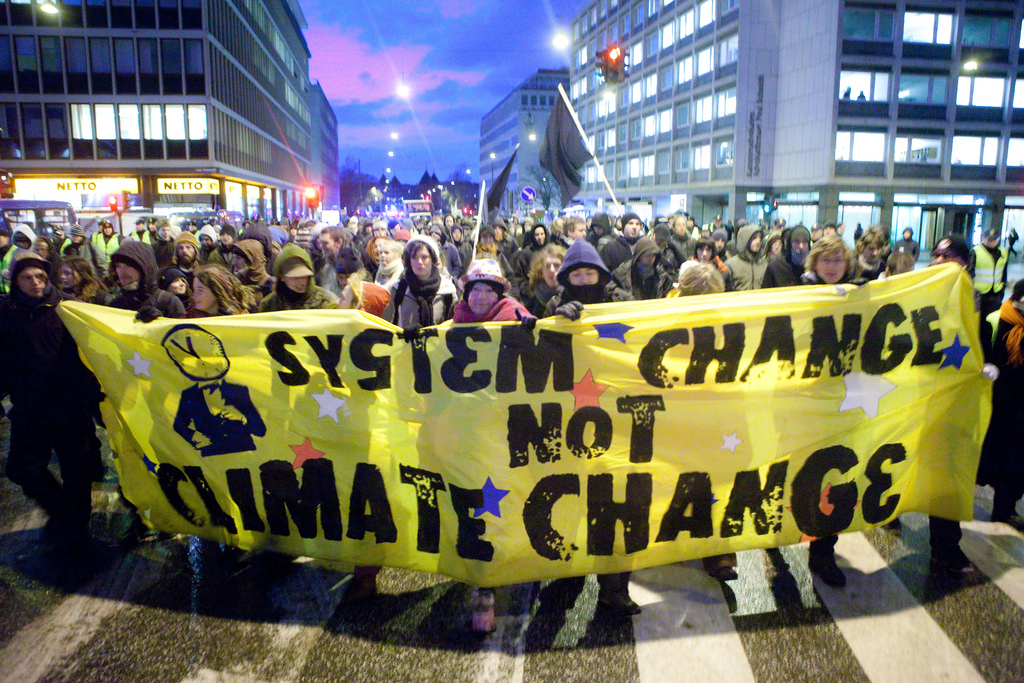6 Things at Stake at the UN Climate Change Conference
by Charlie Mitchell
19 October 2015

The city of lights will switch to energy-saving bulbs this November for the COP21 – metaphorically speaking of course. 196 parties to the 1992 UN Framework Convention on Climate Change will congregate in Paris for the 21st time to produce a legally binding global agreement on climate change and greenhouse gas emissions. They will be joined for this environmental extravaganza by copious NGOs, delegates and journalists.
With existing environmental commitments expiring in 2020 and current trajectories pointing to a 5°C global temperature rise from pre-industrial levels (surpassing the 2°C deemed catastrophic and irreversible), time is quickly running out for global action. Indeed exhausted environmentalists worldwide have been forced to endure sporadic periods of dismay and panic for well over a decade. And rightly so, considering the collapse of the Kyoto Protocol at the hands of greedy deserters and the utter fiasco of the 2009 COP15 in Copenhagen.
So with our backs to the wall, what is at stake in Paris this November?
1. Targets.
What can be expected from the COP is a formal global agreement, incorporating country-specific targets and ensuring they are met. Prolific polluters including the European Union, the US and the BRICS have already committed to emission-reduction goals, although their ambition varies considerably.
China has issued an unremarkable promise that CO2 emissions will peak by 2030. Somewhat pathetically, Russia has pledged to cut greenhouse gases to 70-75% of 1990 levels by 2030. What this fails to disclose is that Soviet Union emissions in 1990 were roughly double those of modern Russia, so this target actually gives Russia the capacity to increase emissions.
2. Widening the responsibility.
Crucial to the talks will be the need to engage non-state actors, notably cities and businesses. It was unearthed in 2013 that a mere 90 corporations are accountable for 63% of global greenhouse gas emissions: a whopping 914 gigatons of CO2. These villains, including BP, Chevron and Gazprom, must be involved in climate change mitigation.
Cities are also expected to become central actors in the struggle: they have the ability to deliver technologically driven sustainable development and to mobilize citizens. Ten global cities spanning five continents have already submitted impressive climate action plans. First prize goes to Copenhagen, which will be carbon neutral by 2025.
3. Finance.
Developing countries are forthright in their desire for financial assistance from wealthy nations to fund sustainable development, infrastructural improvement and emission reduction. A consensus has emerged that $100bn ‘climate finance’ should be supplied annually by 2020, overseen by the Robin Hood-esque Green Climate Fund.
Unsurprisingly the practicalities will prove divisive in Paris. Wealthy countries want the involvement of international development banks and the private sector, while India has placed a $2.5tn price tag on its climate change goals.
4. EU leadership.
EU leaders already agreed in 2014 to cut the bloc’s emissions by 40% by 2030 – a more ambitious target than those mustered by the world’s other large polluters. At a historic juncture for the EU – bruised by the worsening refugee crisis – the potential is there for Jean-Claude Juncker, the president of the European Commission, and his colleagues to lead the talks on home soil.
5. An Australian and Canadian about-face.
The so-called ‘bad boys of climate change’ are heading towards a spectacular change of heart. Malcolm Turnbull, a strong exponent of emission reduction, ousted Australian PM Tony Abbott last month.
Correspondingly in Canada, which is expected to miss its 2020 climate target by 20%, the highly divided electorate will go to the polls on 19 October to choose between current PM Stephen Harper and Justin Trudeau of the Liberal Party.
While the former dismissed CO2 reduction as ‘job killing’, the latter recently professed: “we will go to Paris united as a country in our desire to reduce our emissions.” With pollsters and commentators still baffled, this election is pivotal for the COP. Indeed what is the emission-reduction incentive for developing countries if Canada rebels?
6. The refugee crisis.
In addition to the aforementioned $100bn, further aid-guarantees are required by countries facing climate catastrophe. It is irrefutable that more aggressive storms, longer droughts and escalated flooding are contributing to rising refugee flows.
A much-overlooked dynamic in the Syrian migrant crisis is the three-year drought that displaced 1.5m rural inhabitants and also traverses Lebanon, Jordan, Israel, Iraq and Iran. Numerous other nations from Mexico to Somalia deal concurrently with water shortages and agricultural over-reliance. French PM Francois Hollande warned recently that should discussions fail in Paris, “it won’t be hundreds of thousands of refugees in the next 20 years – it will be millions.”
–
A legally binding agreement is foreseeable, but it will not trigger celebrations from the environmentalist community. A 2°C temperature increase is idealistic, with 3°C a more reasonable target. Ultimately, clear and ambitious commitments are only the first step; they will have to be enforced, evaluated and met.
There are concerns. The disaster of Copenhagen 2009 would render a friendly dialogue on environmental goals a comparative triumph. However decades of profligacy and greed have led us closer to the abyss. What is required is tangible action at the national, city, business and individual level. Paris 2015 represents a formidable opportunity: the consequences of squandering it could be truly momentous.
–
Novara Media is trying to raise £10k in just 30 days. To support our mission to create media for a different politics, go to support.novaramedia.com. Help us spread the word using the hashtag #Novara10k!